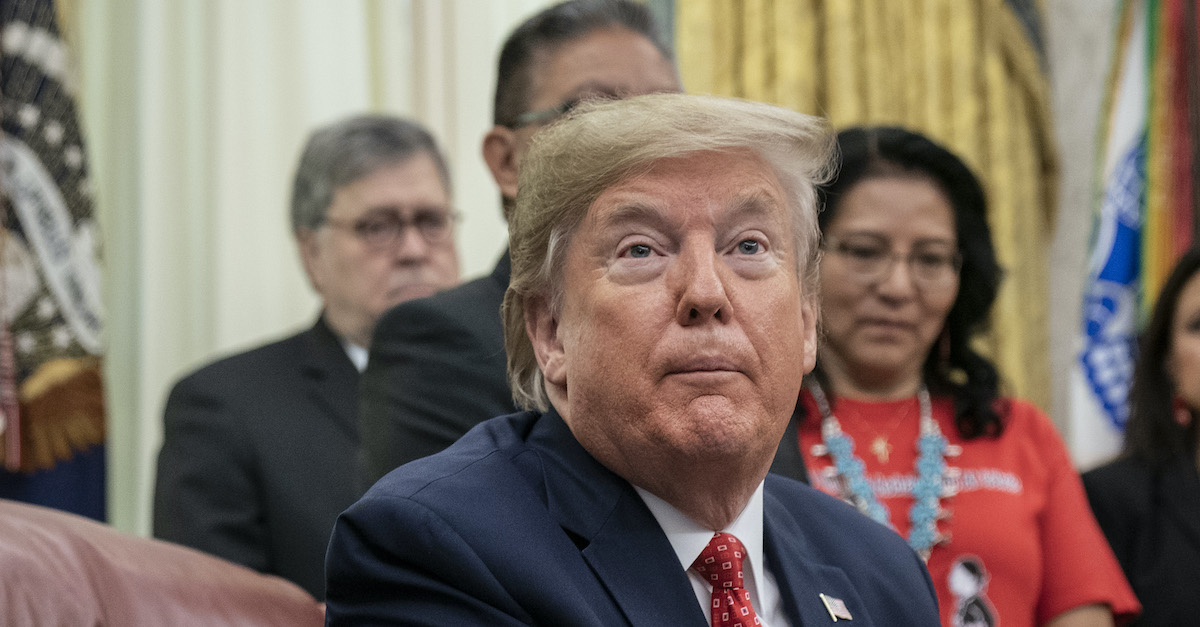
The Department of Justice was placed in the awkward position of having to argue that President Donald Trump was not telling the truth when he told his supporters and the world that he had declassified “any and all” documents related to the federal government’s investigation of the “Russian Hoax”—which would have applied to the investigatory records from Robert Mueller’s team and even the full Mueller Report.
In response to an emergency motion filed by BuzzFeed News journalist Jason Leopold seeking unredacted portions of the Mueller Report and FBI witness interview materials (302s), attorneys from the DOJ insisted that it was simply not so that the president had given any such declassification order.
The latest controversy arose when President Trump announced last week that he had authorized the “total declassification” (i.e., “no redactions”) of “any and all” documents pertaining to the “Russia Hoax.”
“I have fully authorized the total Declassification of any & all documents pertaining to the single greatest political CRIME in American History, the Russia Hoax. Likewise, the Hillary Clinton Email Scandal. No redactions!” Trump tweeted.
He followed that up less than an hour later, tweeting: “All Russia Hoax Scandal information was Declassified by me long ago. Unfortunately for our Country, people have acted very slowly, especially since it is perhaps the biggest political crime in the history of our Country. Act!!!”
BuzzFeed then asked Senior U.S. District Judge Reggie Walton to order the DOJ to reprocess its Freedom of Information Act (FOIA) requests and remove any of the redactions the administration had left in place, arguing that such information couldn’t be legally withheld since, as the president said, it had been completely declassified.
“The President has the authority to declassify documents that are otherwise currently and properly classified. The President has not exercised this authority with respect to any of the FD-302s remaining at issue in this case,” the DOJ wrote in its opposition motion to the news organizations, referring to FBI witness interview notes.
“The Court cannot infer that any such sweeping order exists based on the President’s Twitter statements because they merely suggest that the President ‘authorized’ the ‘declassification’ of unspecified information. The Twitter statements do not refer to any specific document and do not indicate that the President was exercising his Constitutional authority to declassify specific information. They were not an order to declassify particular material.”
In fact, the DOJ even argued that it is the position of the White House that President Trump’s Twitter statements essentially carried no official weight, even though he was touting his presidential authority to unveil all “Russia Hoax” documents without redactions.
“And the White House has made clear that the Twitter statements ‘do not require altering any redactions on any record at issue in this case, including, but not limited to, any redactions taken pursuant to any discretionary FOIA exemptions,’” the DOJ wrote. “Nor do the President’s statements on Twitter prevent the Department from taking appropriate exemptions and redacting documents consistent with law and the positions the Department takes in FOIA matters.’ Therefore, the Twitter statements do not, as Plaintiffs argue, operate as a waiver of any of these exemptions.”
As previously reported by Law&Crime, a similar tactic was employed by court-appointed amicus curiae John Gleeson in the ongoing litigation over whether the criminal case against Michael Flynn will be dismissed. Gleeson argued that U.S. District Judge Emmet Sullivan should take the president’s comments about the case into account when making a decision about whether or not to grant the Flynn-DOJ joint effort to permanently end the prosecution.
Earlier this year, U.S. District Judge Amit Mehta, an appointee of President Barack Obama, rejected a request to lift further redactions from 391-pages of the Carter Page FISA warrant application based on Trump’s tweets about declassifying documents. Mehta reasoned that Trump’s tweets “amount to little more than a mere assertion of bad faith,” and do not substantiate “any personal knowledge on the part of the President with respect to the actual withholdings and the exemptions invoked [by the DOJ].”
Additionally, the DOJ, when arguing on matters of national security, has successfully convinced courts before that the president’s Twitter statements on such matters should not force them to hand over secret documents.
Read the DOJ’s full filing below:
DOJ Memo on Declassification by Law&Crime on Scribd
[image via Drew Angerer/Getty Images]